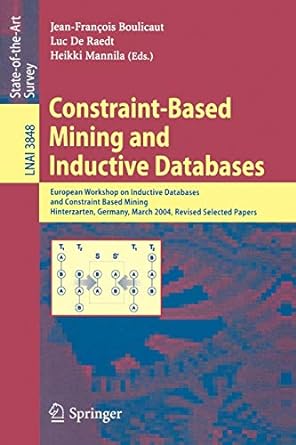Question
You're exploring a database and you find some sample data in two tables: courseNum credits textbookTitle author COP4710 4 Database Systems Jones COP4711 4 Database
You're exploring a database and you find some sample data in two tables:
| courseNum | credits | textbookTitle | author |
|---|---|---|---|
| COP4710 | 4 | Database Systems | Jones |
| COP4711 | 4 | Database Systems | Jones |
| COP4720 | 4 | Data Algorithms | Jones |
| MAT1001 | 3 | College Algebra | Watson |
| MAT1002 | 4 | College Algebra | Watson |
| ENG4267 | 4 | Materials | Smith |
| ENG4280 | 3 | Materials | Smith |
Textbook
| title | author | qty | price |
|---|---|---|---|
| Database Systems | Jones | 10 | 125.99 |
| Data Algorithms | Jones | 6 | 75.50 |
| College Algebra | Watson | 21 | 60.00 |
| Materials | Smith | 9 | 74.25 |
| Materials | Edwards | 3 | 99.99 |
The Textbook table uses a natural key, the combination of title and author.
The same combination of columns is in the Course table where its a foreign key.
(a) Since (title, author) is the primary key of Textbook and a foreign key in Course, is the repeated paring of title and author in the Course table a redundancy?
(b) If the Textbook table had a surrogate key instead of a natural one, do you think it would improve the Course table, or would it make no difference?
Step by Step Solution
There are 3 Steps involved in it
Step: 1

Get Instant Access to Expert-Tailored Solutions
See step-by-step solutions with expert insights and AI powered tools for academic success
Step: 2

Step: 3

Ace Your Homework with AI
Get the answers you need in no time with our AI-driven, step-by-step assistance
Get Started


